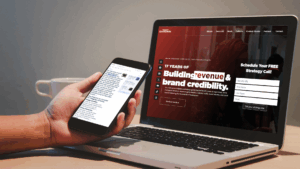Over the past few years, leaders have taken an empathetic approach to coaching their team. While some may feel this type of leadership is controversial, the approach is necessary.
Times have changed. Leadership falls beyond the workplace, because work has fallen beyond the office. In a largely remote workforce, team members have merged their personal and work lives.

Working from home is a brand new territory for many. Having to self-motivate, self-inspire and self-reflect in order to grow – all in a solitary environment. With this in mind, leadership also has to guide their teams through various challenges, and adapt to new norms.
Let’s talk about team interaction. In the office, you would pass desks with friendly smiles and delightful hello’s as you made your way to your desk. While seemingly simple, that small interaction sets the tone for the day. Virtually, some companies connect via Skype or Google Meet – but the interaction is different. The level of camaraderie has changed since being remote due to virtual capabilities.
Now, think about how giving and receiving feedback has changed since moving to a virtual workplace. In the office, leaders were able to actively give critical feedback and send their team members back into an office space of supportive peers. Now, after giving critical feedback, both parties hang up their video calls and are in solitude in their home office.
This type of pattern could begin to affect the way your team performs and motivates them self toward a goal. It also could affect the longevity of that team member at your company, if and how they continue to grow, and if they would recommend your business as a place of employment.

As a leader, you need to be focused on two very important things: Leading with Curiosity and Compassion. As a curious and compassionate leader, you have the ability to build trust, motivation and loyalty amongst your team. Not quite sure how to become a compassionate leader? Here are three quick ways you can adapt your leadership style:
1. Be Flexible
Flexibility is key when leading a team – especially in today’s climate. With so many unknowns, it’s important to be adaptable and understand that things may not always go according to plan. If something comes up that derails your team’s progress, don’t get flustered – instead, try to see the situation from their perspective and work together to come up with a solution.
2. Encourage Open Communication
As a leader, one of your most important jobs is to create an open and safe environment where team members feel comfortable communicating with you – even if it’s just to vent or let off some steam. When team members feel like they can openly communicate with you, they’ll be more likely to trust you and feel supported in their work. Plus, they’ll be more likely to come to you with innovative ideas or problems that need solving – which can only benefit the team as a whole.
3. Show Your Appreciation
Everyone likes feeling appreciated, and your team members are no exception. Whether it’s verbally acknowledging a job well done or sending a handwritten thank-you note, take the time to show your team how much you appreciate their hard work and dedication. Not only will this make them feel good, but it will also motivate them to keep up the good work – which benefits everyone involved.
Leading with compassion may not be easy, but it’s definitely worth it. By being flexible, encouraging open communication, and showing your appreciation, you can build trust among your team members and create a positive work environment – even during challenging times. So don’t be afraid to show some empathy – your team will thank you for it!












